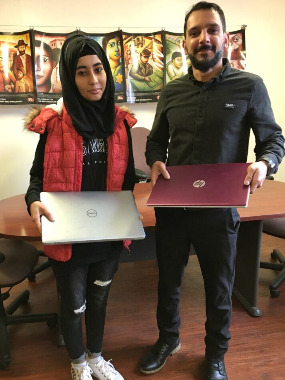
digital literacy
Haieda Sharifi received a laptop from the Digital Literacy Program in Erie, Pennsylvania, through the U.S. Committee for Refugees and Immigrants with funding from The Church of Jesus Christ of Latter-day Saints. She is pictured with Hamid Mobin, a committee staff member, after being hired to help in the women’s connect program. Photo courtesy of USCRI, courtesy of Church News. All rights reserved.This story appears here courtesy of TheChurchNews.com. It is not for use by other media.
By Mary Richards, Church News
A mother and her two eldest daughters in the Erie, Pennsylvania, area hoped to improve their English after coming to the United States as refugees from Afghanistan.
They received laptop computers from the U.S. Committee for Refugees and Immigrants and started taking English classes online from the safety and comfort of their own homes. And with increased language learning came increased self-sufficiency, independence and empowerment.
They represent the several hundred refugees and immigrants from several countries being helped by the committee’s Digital Literacy Program.
Funding from The Church of Jesus Christ of Latter-day Saints helped with the program. Dylanna Grasinger, senior director of field offices for the U.S. Committee for Refugees and Immigrants, shared some of the effect with the Church News.
“We’ve had stories where you’re impacting families with children who have been struggling. You’re impacting single mothers who may not have resources at the beginning of the resettlement period or have gone back to work and are struggling in other areas,” she said.
Without a computer or internet access, other immigrants and refugees felt socially isolated or cut off from family far away. Children couldn’t do remote schooling during lockdowns. Parents couldn’t find jobs.
But with digital access and language learning capabilities, more of them were able to work, pursue more educational opportunities and support their families.
“This funding in various capacities that has been rolled out to offices has been able to help address those needs,” said Grasinger.
The program began in Colchester, Vermont, and expanded to six other sites in metropolitan areas with significant numbers of immigrants and refugees: Erie, Pennsylvania; Cleveland, Ohio; Des Moines, Iowa; Albany, New York; Dearborn, Michigan; and Raleigh, North Carolina.
The project goal was to provide 180 laptops or Chromebooks to immigrants and refugees in those seven areas. To date, 214 laptops were distributed.
Some households needed more than one laptop for multiple family members, so approximately 446 people have been served to date through the program, representing about 166 households.
The beneficiaries included refugees and immigrants from many countries, including Mexico, Honduras, Guatemala, Afghanistan, Congo, Burundi, Venezuela, El Salvador, Dominican Republic and the Philippines.
Grasinger explained that the Church funds have not only helped with digital literacy and technology efforts, but in many other ways as USCRI reaches out to refugees and immigrants.
“When headquarters originally put the proposal together, what we were looking at is really making sure that a vulnerable population was not lost in a gap,” she said. “We wanted to make sure that access to technology, that the products could actually deliver that technology and the skills set to use it were all in place.”
Grasinger said USCRI is now able to build off of the funds the Church awarded the organization. For example, the Erie field office has received a digital literacy grant through the state of Pennsylvania to continue.
She said it is an example of the intersection of different kinds of groups — faith, nonprofit and political — working to better the lives of those in need.
Copyright 2022 Deseret News Publishing Company.